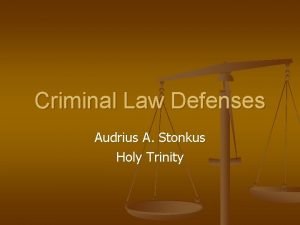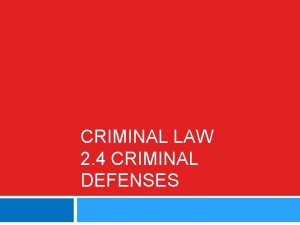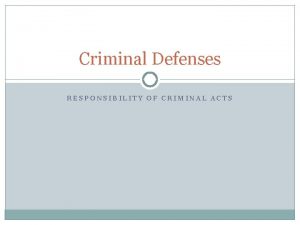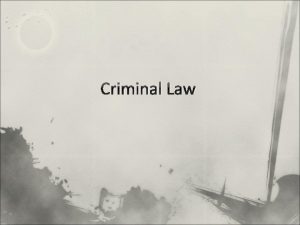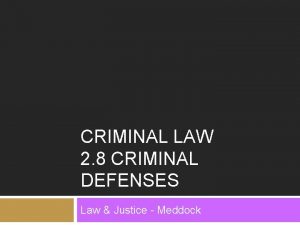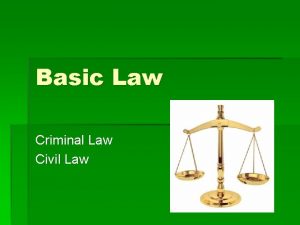Criminal Law Defenses Audrius A Stonkus Holy Trinity












- Slides: 12

Criminal Law Defenses Audrius A. Stonkus Holy Trinity

What is the definition of "entrapment"? n n A: "Entrapment" is a defense to a criminal charge raised in cases where overzealous law enforcement agents induce a person to commit a crime. The theory behind the defense of entrapment is that we shouldn't punish someone who was induced by the government to commit a crime. A valid entrapment defense has two related components: Governmental inducement of the crime and Lack of predisposition on the part of the defendant to commit the crime The defendant has the initial burden of proving the government induced him to commit the crime. Then the burden rests on the government to overcome an entrapment defense by proving beyond a reasonable doubt that the defendant was predisposed to commit the crime.

Entrapment, continued n n n Entrapment occurs when the criminal design starts with law enforcement officers, who plant the idea to commit the crime in the mind of an innocent person, and then convince him to do the crime so they can prosecute him. "Predisposition" focuses on whether the defendant was an unwary innocent who, but for the inducement of the officers, wouldn't have committed the crime. The fact that law enforcement agents provide the opportunity or place for the crime doesn't add up to entrapment. It's only entrapment when the idea for committing the crime is planted in the defendant's mind by law enforcement.

Q: When should an insanity defense be considered? n n A: The insanity defense is based on the belief that it is inherently unfair to punish people for their criminal acts if they're not mentally responsible for those acts. The most popular definition of insanity is the "Mc. Naughton rule, " which defines insanity as "the inability to distinguish right from wrong. " Some have amended their laws to include standards of "diminished capacity" or "guilty but mentally ill. " Insane persons are also considered to be incapable of committing criminal offences. Section 16 of the Criminal Code presumes that everyone is sane but permits defendants to establish that they were insane at the time of the commission of an offence. It should be noted that the insanity defense is not used as often as the general population may believe

Q: What does it mean when someone is declared "incompetent to stand trial? " n A: "Incompetent to stand trial" refers to a defendant's mindset at time of trial. Usually, a trial will not proceed until a defendant is deemed competent to understand the charges and face his or her accusers.

Q: When is self defense a defense? n n A: The defense of "self defense" is what's called an "affirmative defense. " The prosecution must disprove self -defense beyond a reasonable doubt. While the law as to self-defense may vary from state to state, generally a person is justified in using physical force when it's necessary to defend himself or a third person from what he reasonably believes to be the use or imminent use of unlawful physical force by the other person. How much force can you exert in self-defense? The degree of force you reasonably believe to be necessary to defend yourself or another person from an unlawful use of force.

n n n Can you ever respond to an attack or threat of an attack by using deadly force? Deadly physical force may be used only if you reasonably believe a lesser degree of force is inadequate, and you have a reasonable belief that you or another person is in imminent danger of being killed or of sustaining great bodily injury. You aren't justified in using physical force if you provoke the use of unlawful physical force by another person. And you can't justify your use of physical force if you're the initial aggressor. Also, physical force isn't justified where it's the result of an unauthorized combat by agreement.

Q: What is an alibi? n A: In order to establish an alibi, an individual must be able to provide proof that he or she was not at the scene of the crime. Often testimony from other individuals can be used to establish where the person was, or wasn't. Other records such as videos that are date- and timestamped, or work records can help establish the location of an individual at the time the crime was committed.

What is a “defence of capacity” n n n Defence of Capacity In certain cases, individuals will be found not guilty, even though the prohibited act and the intention to commit this act are proven, because the individuals are deemed incapable by law of committing the offence in question. For example, any child under the age of 12 years cannot commit a criminal offence. As well, any boy or girl under the age of 18 must be tried in the juvenile courts under the Young Offenders Act unless he or she is ordered to stand trial in the adult court by a juvenile court judge. The reasoning for this is similar to the insanity defence.

What are some other defences? n n To prove that someone has committed a prohibited act, it must be demonstrated that the act or omission was consciously and voluntarily committed. Defences that fall into this category include accident, duress (ie, a person has been compelled to commit an offence because his or his family's life or safety have been threatened)- Where have we seen this one? and automatism, which may be generally defined as involuntary, unconscious behaviour where the physical movements are performed without volition or without exercise of the will (eg, a person, as a result of an external blow to the head, commits a prohibited act while in an unconscious or semiconscious state, or a person who commits an offence while sleepwalking).

What are Defences that Negate Proof of Mens Rea n n In most "true" criminal offences, the Crown must prove that, before committing the act, the accused actually intended to achieve the unlawful result. The law recognizes that certain factors raise a reasonable doubt that the person intended to achieve the unlawful consequence. The defences usually mentioned in this context include intoxication (which is commonly used to reduce a murder charge to the lesser offence of manslaughter), honest mistake of fact, and, in some very limited circumstances, mistake of law. However, in the vast majority of factual situations, ignorance of the law provides no defence.

Is there a defence of excuse or justification defence? n n n With these defences, the law will hold that the accused was either justified in committing the unlawful act or is at least partially excused for the conduct. Examples of defences of justification are self-defence and defence of property. In 1990 the Supreme Court of Canada found the defence of self -defence can apply to a battered woman who kills her batterer at a time when her life is not in imminent danger. Recognition of the "battered woman syndrome" expanded the scope of evidence which could be used to prove self-defence to include the psychological effects of battering on women charged with assaulting or even killing their battering partners. ” Defences of excuse include obedience to authority (eg, a soldier who believes he is simply obeying lawful orders), provocation (which only applies in murder cases and involves a killing committed in the heat of passion, which has been caused suddenly by a wrongful act or insult sufficient to deprive an ordinary person of his self-control
 Audrius stonkus
Audrius stonkus Holy trinity
Holy trinity Audrius stonkus
Audrius stonkus Glory glory oh god almighty
Glory glory oh god almighty Holy holy are you lord
Holy holy are you lord What is a civil law
What is a civil law Difference between civil law and criminal law
Difference between civil law and criminal law Holy trinity chapter 1
Holy trinity chapter 1 The mystery of the holy trinity
The mystery of the holy trinity Order of the most holy trinity and of the captives
Order of the most holy trinity and of the captives Church fathers trinity
Church fathers trinity The holy trinity explained
The holy trinity explained Holy trinity lesson plan
Holy trinity lesson plan

